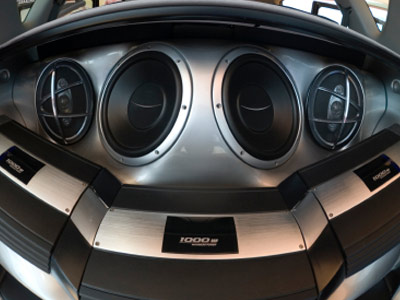Upgrading the car stereo receiver is a good way to get more audio options, like a better equalizer, clearer radio signals and even CD or MP3 player capability. But for dramatic improvements in sound quality, you’ll need more than just a new car stereo.
Amplifiers are used to supply extra power to your car audio components. They do exactly what their name indicates — they amplify electrical signals to send more juice to your entire audio system. The standard car stereo actually comes with its own, built-in amplifier; however, it’s limited by space. Usually, these built-in amps are too small to send the power a high-fidelity custom stereo system requires.
As such, an external car audio amplifier is almost always necessary when you’re running a lot of components in your system. If you’re planning to purchase component speakers, tweeters and a subwoofer for your car, the stock power supply system just won’t do this new car audio equipment justice.
With an amplifier, you can expect much higher quality sound from all of your car audio components. Amps can cost anywhere from $80 to several hundred dollars, depending on power output and the number of channels. The number of channels you need is dependent on the number of components you want the amp to power.
Proper tuning is also important to your stereo system. Even if you purchase all new sound equipment for your car, you’ll still have to make sure the settings are right; otherwise the audio quality will remain poor. Set the car audio equalizer according to what you listen to most — if you’re into classical music or talk radio, maybe you don’t need to the bass turned up to hip-hop levels. Most aftermarket stereos come with several pre-set options for tuning based on different types of listening. Select the one you like best, or tune it yourself.
One last piece of advice: Make sure the amplifier’s gain control isn’t set too high; otherwise you could face some nasty audio distortion issues. As for the radio, try to avoid excessive boosts in bass and treble, while turning the overall settings up a bit more [source: Fay].

Amplifiers, Receivers and Other Car Audio Equipment
by
Tags:

Leave a Reply